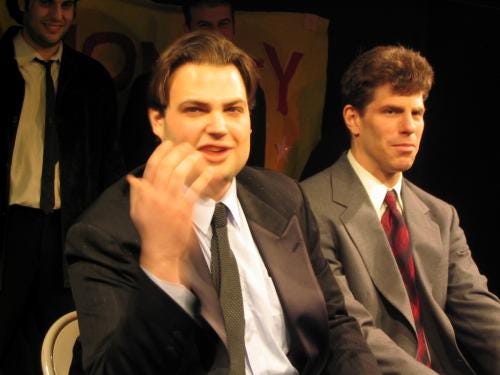I got a lot of email responded to last week’s column “Let’s Ban The Voice of Reason.”
There were roughly two camps: 1) improvisers who thanked me because they are tired of being told to “do voice of reason,” and 2) improv teachers telling me I was crazy and that the voice of reason is necessary.
There were also a few improvisers telling me they had tried following my instructions for “good voice of reason” and were noted that they were doing it wrong. I am sorry about that. Improv teachers, including myself, are fickle and hard to pin down. What can I say, improv classes are a trap! (Please take classes at my improv school).
I don’t have too much to add to what I wrote about voice of reason. My “TL;DR” version is “uninvested voices of reason are bad, emotionally invested voices of reason are good.” The headline was salty, but the essay was really not too crazy.
Exercises Hit More Than Notes
But also I want to say something to my fellow improv teachers/coaches: very often an exercise is more powerful than a note.

What prompted my attack on voices of reason last week was watching students do “weird world” scenes - scenes where no one is allowed to be the voice of reason. They were more fun …. and more grounded. With no prompting from me.
For example, you can tell people “justify your scenes” but you’ll often just get puzzled looks, questions, requests for clarifications, arguments. In a “weird world” scene they will often justify themselves —- which you can point out after it’s done. “Your characters did a really good job of explaining themselves in that one.”
The Documentary Fixed My Team
My first UCB house team (Feb 2001, kill me for how long ago that was) was having trouble with basic agreement in open scenes — meaning “get a suggestion and go” scenes. One of our coaches (Andy Secunda) noted us pretty directly “you are not saying yes.” We accepted that but then weirdly could not do any better in the scenes.
Andy laughed and had us move on. “Let’s just keep going — what are you guys working on?”
It happened to be we were practicing the Documentary, which our regular coach Billy Merritt was developing. Andy said “All right let’s see it.”
Billy’s opening for the Doc had two people pretend to be interviewed. Like if the suggestion was “lobster” two people might sit down and improvise that they were being interviewed by an unseen person about a lobster restaurant.
Andy stopped us halfway — “your guys agreement in this opening is really good. So much better!” I remember thinking “it is?” Andy pointed it out — “Yeah, you’re all fully accepting everything the other person says.”
Somehow that unlocked agreement for me and the team. We could “Say yes” in the Doc, and once we recognized that, we could do it everywhere.
We started doing the Doc opening for our Harolds, and if I recall correctly, they started getting really good. Here are some blurry photos from us doing a Doc opening from sometime in 2002 or 2003. I am posting them for no reason other than I have them.




We also wore suits for our Harolds which may have been.. stupid?
What Form/Exercise For What Note?
Sometimes the best fix for a team’s problem is to try a new form or a new opening or a new exercise. Once a team can FEEL something working, they can keep doing it.
Here’s my estimation of what certain forms and exercises teach. Meaning if you do these forms, certain good habits just seem to show up.
Monoscene → object work, emotional commitment.
Premise Harolds → initiations, game-based support work
Harolds (any kind) → connections
Documentary → agreement, character energy
Sound and Movement opening → getting out of your head, physical agreement
Ad Game (exercise), Guest Panel (Exercise) → saying yes
La Ronde → character energy
Pretty Flower → if this is true, what else is true
I put a bunch of exercises in this post that I think help with playing game of the scene:
Let me know of other exercises or forms that you think trick a team into being good!
Plugs
The World’s Greatest Improv School: The improv school I run with Jim Woods and Sarah Claspell. We’ve got classes online, in LA and even a few in NYC!
How to Be The Greatest Improviser On Earth - My improv book, available at Amazon. Kindle or print. It’s a hodge-podge of advice I wrote in 2016 about doing improv. If you’re broke and want a free PDF version just email me and I’ll send it over.
Subscribe!
Paid subscribers to this Substack get their own Q&A columns where they can ask questions. Start a paid subscription to get access to these Q&As.
Everything else is free for everyone. I’ve unlocked all the old paid columns too. Thank you for reading!





Confession opening is good for justification, since every premise usually has a built-in one.
What I'd like to hear is an exercise or form to work on aspects of exploration other than the justification/philosophy of the unusual person, like integrating heightening moves into the world, exploring how it is possible for these absurd things to exist in the world, exploring the funny consequences.
Actually: your second Harold team. Based on those photos.